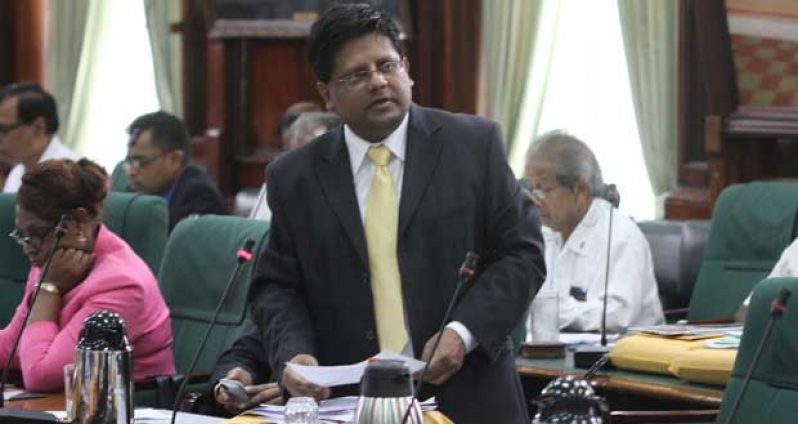SHADOW finance minister, Mr Carl Greenidge, yesterday moved a Motion seeking to bring Finance Minister Dr. Ashni Singh before a Parliamentary Privileges Committee.
Greenidge claims that Minister Singh violated the law by spending monies disapproved by the Combined Opposition during the 2014 Budget debates, as reflected in a $4.6B Statement of Excess he has tabled in the National

Assembly on June 19 last.
The fourth Statement of Excess since the start of the 10th Parliament, Financial Paper 1/2014, tabled in the National Assembly on June 19, is yet to be considered by the House at the next sitting. It reflects spending from January 1, 2014 to June 16, 2014.
Greenidge says that a “constitutional crisis” is being created by the Finance Minister’s use of public funds because the sums included on the $4.6B Statement of Excess represent expenditure not approved by the National Assembly. The APNU Member of Parliament was emphatic that the issue is an important one, hence the move to have Dr. Singh appear before a Privileges Committee to face sanctions.
The Speaker of the House, Raphael Trotman, noted that the Clerk of the Assembly, Mr. Sherlock Isaacs, has received a copy of the motion signed by Greenidge and co-signed by Leader of the Alliance For Change, Mr Khemraj Ramjattan.
LEGAL SPENDING
The Finance Minister, who was granted leave of absence from yesterday’s sitting of the House, has repeatedly defended the legality of spending authorised by him. At his most recent press conference, he said Statements of Excess do not reflect spending from the Contingencies Fund.
Section 218 (3) of the Constitution states that: “If, in respect of any financial year, it is found: (a) that the amount appropriated by the Appropriation Act for any purpose is insufficient, or that a need has arisen for expenditure for a purpose for which no amount has been appropriated by that Act;
“Or (b) that any moneys have been expended for any purpose in excess of the amount appropriated for that purpose by the Appropriation Act, or for a purpose for which no amount has been appropriated by that Act, a supplementary estimate or, as the case may be, a Statement of Excess showing the sums required or spent, shall be laid before the Assembly by the Prime Minister or any other Minister designated by the President.”
According to Dr. Singh, given that the law states that spending from the Contingencies Fund has to be “urgent, unavoidable and unforeseen need for expenditure,” the Statement of Excess cannot reflect monies spent from there.
He noted that the Statements of Excess are indeed spending from the Consolidated Fund.
To date, in the 10th Parliament, four Statements of Excess have been tabled, 58 per cent of which has been approved by the combined Opposition.
Dr Singh also referred to the Parliamentary Standing Order 78 (1), which deals with supplementary estimates of expenditure and statements of excess. The Order states that: “If in respect of any financial year it is found:- [a] that the amount appropriated by the Appropriation Act for any purpose is insufficient, or that a need has arisen for expenditure for a purpose for which amount has been appropriated by that Act; or [b] that any moneys have been expended for any purpose in excess of the amount appropriated for that purpose by the Appropriation Act, or for a purpose for which no amount has been appropriated by that Act; or [c] that advances have been made from the Contingencies Fund for expenditure for which no other provision exists, a Minister may present a Paper with the Supplementary Estimate or, as the case may be, the Statement of Excess, showing the sums required or spent; and that Paper shall be ordered to be printed and shall stand referred to the Committee of Supply without question put, and shall be appointed to be considered on a day to be named by the Minister presenting the Paper, but not earlier than one (1) day after that on which the Paper was presented.”
The Finance Minister maintains his contention that all public spending advanced by the current Administration has been done within the stated legal parameters, and can withstand any level of scrutiny.
(By Vanessa Narine)



.jpg)









